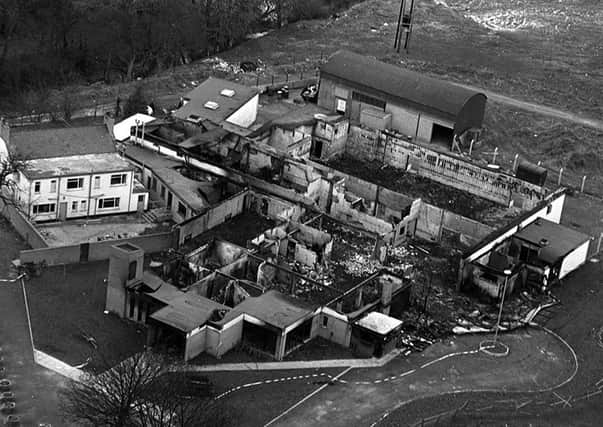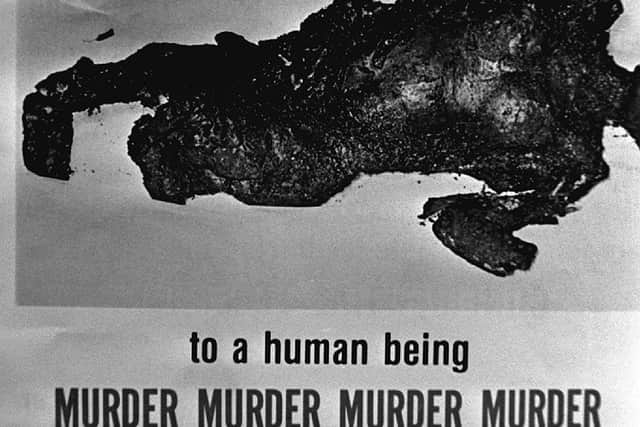Let the Ballymurphy findings show the way to getting legacy inquests for victims of terrorism


Although long it does convey something of the context of three days of almost non-stop action. The families of those who died suffered terribly and deserved to know what actually happened to their loved ones.
Inquests into the deceased were originally held in 1972 and recorded Open Verdicts.
Advertisement
Hide AdAdvertisement
Hide AdIn 2011 the attorney general, pressurised by representatives of the families and Sinn Fein, confirmed the criteria required for him to order fresh inquests.


He accepted that there was now available some potential information which had not been presented to the original inquests and also that the investigations into the deaths by the RUC had been inadequate; accordingly he directed new inquests be held.
The attorney general was aware that there would be severe limitations as to what could be achieved but he decided that the interests of justice demanded a much more complete investigation than had been possible in 1972.
In addition, he was aware that since the introduction of the Human Rights Act 1998, incorporating into British law the provisions of the European Convention on Human Rights, the fundamental nature of inquests had changed.
Advertisement
Hide AdAdvertisement
Hide AdPreviously inquests had looked only at who the deceased was and how, when and where they came by their death. Under ECHR [which the UK Supreme Court decided would be applied retrospectively] inquests could also examine any and all of the circumstances surrounding a death.
It also placed special emphasis upon investigating deaths involving agents of the state, although of course Article Two of the ECHR, the Right to Life, applies to everyone.
These new inquests effectively become mini-public inquiries hence the strong legal representation in the Ballymurphy case. Almost 30 barristers and solicitors were involved along with dozens of support staff.
They mainly represented the interests of the families and were paid from public funds; the final cost will be considerable.
Advertisement
Hide AdAdvertisement
Hide AdWith the fresh inquests ordered it remained for the coroner, in this case a judge of the High Court, to decide as to how she would conduct the investigation and among the areas she chose to examine were the degree of preparation and planning and the control of the troops involved, their actions, the nature and degree of force used and whether or not there was a deliberate use of unjustified lethal force.
It was to be a comprehensive examination; in military parlance, to look at what happened strategically, operationally and tactically.
The limitations after all this time proved considerable and unsurprisingly the memory of witnesses after nearly 50 years was often incomplete, fragmentary, contaminated, irrelevant, contradictory or confused.
Incidentally the burden of proof required at inquests is the civil burden, on the balance of probabilities, and not the criminal burden, beyond reasonable doubt.
Advertisement
Hide AdAdvertisement
Hide AdWhat the witness evidence does convey most clearly is that the possibility of obtaining convictions in criminal cases after many years based largely upon eye witness accounts, is doubtful in the extreme.
What the entire process of the Ballymurphy inquests, from conception through conduct, has provided us with is opportunity. The opportunity to demand, as the Ballymurphy families demanded, fresh inquests into the deaths of many hundreds of our citizens who were killed during the Troubles. In the interests of a search for the truth, fairness, balance, and consistency this is precisely what is required.
If the law loses these things it is brought into disrepute
The attorney general’s criteria for new inquests are straightforwardly achieved.
Firstly, contained within the Special Branch and the CID files on hundreds of deceased persons, is information not made available to the original inquests and I would submit that most of those files contain considerably more information than was available to the attorney general when making his decisions in 2011.
Advertisement
Hide AdAdvertisement
Hide AdNow that even the most sensitive intelligence reports are regularly being cleared for release, suitably redacted if necessary, to inquiries, contemporary inquests, criminal prosecutions and civil claims there is no reason for them not being made available for fresh historical inquests.
Secondly, as to the original RUC investigations being adjudged inadequate, that is, by modern standards, a given. Our CID did their utmost but by the standards of the here and now they were under strength, under trained, lacked modern forensic capacity and operated in more hostile environments.
How could one possibly conduct extensive house to house enquiries in say South Armagh in 1971, 1981 or 1991 and expect the locals to assist [and sign their own death warrant] or without making oneself or a soldier or policeman guarding you another target for an early death?
Thirdly, information which would satisfy the range of issues deemed appropriate to be addressed by the coroner in this case, the strategic, operational and tactical command and control exercised by those held responsible, directly and indirectly, is also contained aplenty within the files.
Advertisement
Hide AdAdvertisement
Hide AdRecently I wrote about an incident where two young soldiers died (see link below). By the standards applied at ‘Ballymurphy’ I should have been a witness of the first rank at their inquests. I was never sent for and have never been informed as to when their inquests were held.
A colleague of mine in the RUC lost his brother, also a serving RUC officer, murdered by the IRA in Derry / Londonderry. He informs me that his brother’s inquest lasted less than fifteen minutes and his family never even received a letter from the coroner.
Whose fresh inquests might we legitimately demand? One thinks of some 100 victims of the IRA in Fermanagh; 95% of those murders were never officially solved but the files I refer to contain details of those involved and how they carried out their operations none of which was disclosed to the original inquests. I think of the sectarian murders of Roman Catholics in North Belfast and elsewhere, many still unsolved but the RUC often knew exactly who had carried out the vile deeds and who directed them.
The criminal burden of proof was elusive but the civil burden would be well met, indeed by the standards demonstrated in ‘Ballymurphy’, comfortably exceeded.
Advertisement
Hide AdAdvertisement
Hide AdIn South Armagh over 150 murders were carried out by the IRA operating from what were then safe bases in North Louth and Co Monaghan.
Very few of these murders were solved but fresh inquests would reveal exactly who had committed them, who commanded and controlled them and from where they planned, prepared and executed their operations. If the law declines to permit individuals to be named there is still plenty of information which would bring explanation and comfort to the bereaved.
One thinks of terrorist atrocities at La Mon, Teebane, Bloody Friday, Enniskillen, Claudy and hundreds of individual cases; sadly, without the benefit of a Sinn Fein organised campaign, rapidly being forgotten. Ballymurphy has clearly illuminated for us the way ahead. A major issue with many families has simply been getting someone to listen and take their loss seriously. The Ballymurphy families have been successful in achieving this.
If you lost a relative or friend in the Troubles might I suggest that you write to the sttorney general stating that you believe there is considerable information within the CID and Special Branch files relating to the circumstances surrounding their death which was never made available to the original inquest.
Advertisement
Hide AdAdvertisement
Hide AdAlso, that the information contained within those files, in the vast majority of cases, considerably exceeds the threshold which justified the instructions of the then attorney general to order the new Ballymurphy inquests. Add that the original RUC investigations into the deaths were obviously inadequate.
Copy your correspondence to your elected representative, political party of choice and this newspaper. Please emphasise that you are merely seeking the truth, fairness, balance and consistency without which the law is always brought into disrepute.
A one-sided application of the resources of the law fatally undermines the majesty of the law.
• Dr Bill Duff Served in the Parachute Regiment and the Royal Ulster Constabulary
Advertisement
Hide AdAdvertisement
Hide AdBill Duff on the recent veteran trial: We soldiers feared becoming the 16th victim of the IRA terrorist Joe McCann
——— ———
A message from the Editor:
Thank you for reading this story on our website. While I have your attention, I also have an important request to make of you.
With the coronavirus lockdown having a major impact on many of our advertisers — and consequently the revenue we receive — we are more reliant than ever on you taking out a digital subscription.
Subscribe to newsletter.co.uk and enjoy unlimited access to the best Northern Ireland and UK news and information online and on our app. With a digital subscription, you can read more than 5 articles, see fewer ads, enjoy faster load times, and get access to exclusive newsletters and content. Visit https://www.newsletter.co.uk/subscriptions now to sign up.
Advertisement
Hide AdAdvertisement
Hide AdOur journalism costs money and we rely on advertising, print and digital revenues to help to support them. By supporting us, we are able to support you in providing trusted, fact-checked content for this website.
Alistair Bushe
Editor